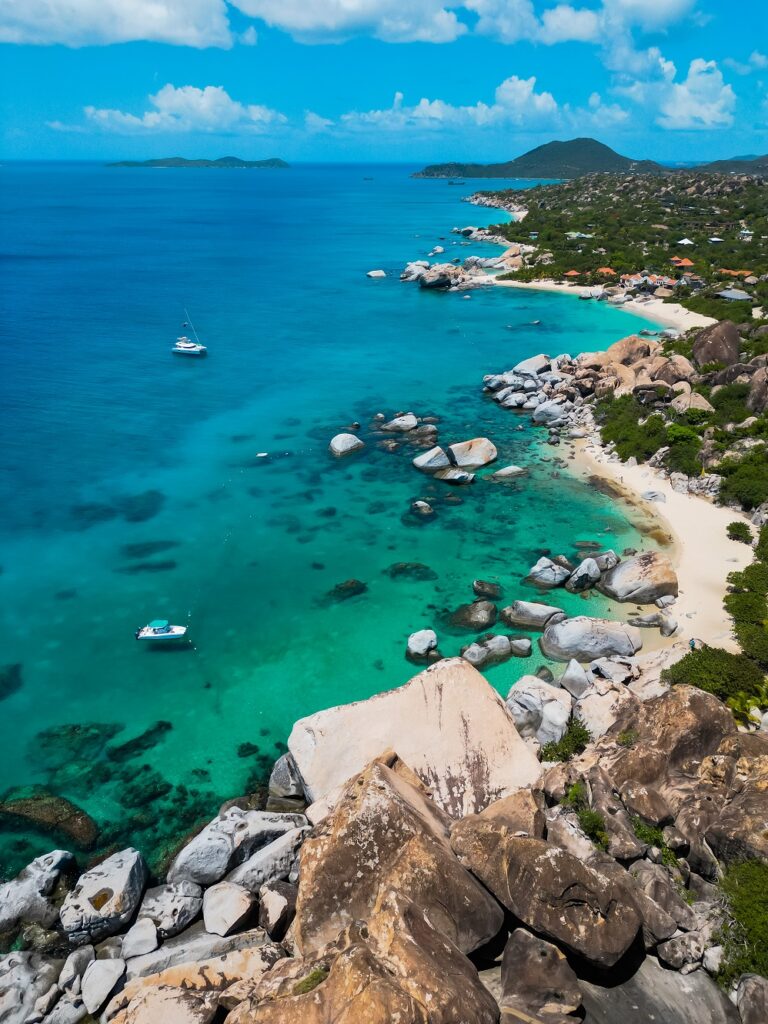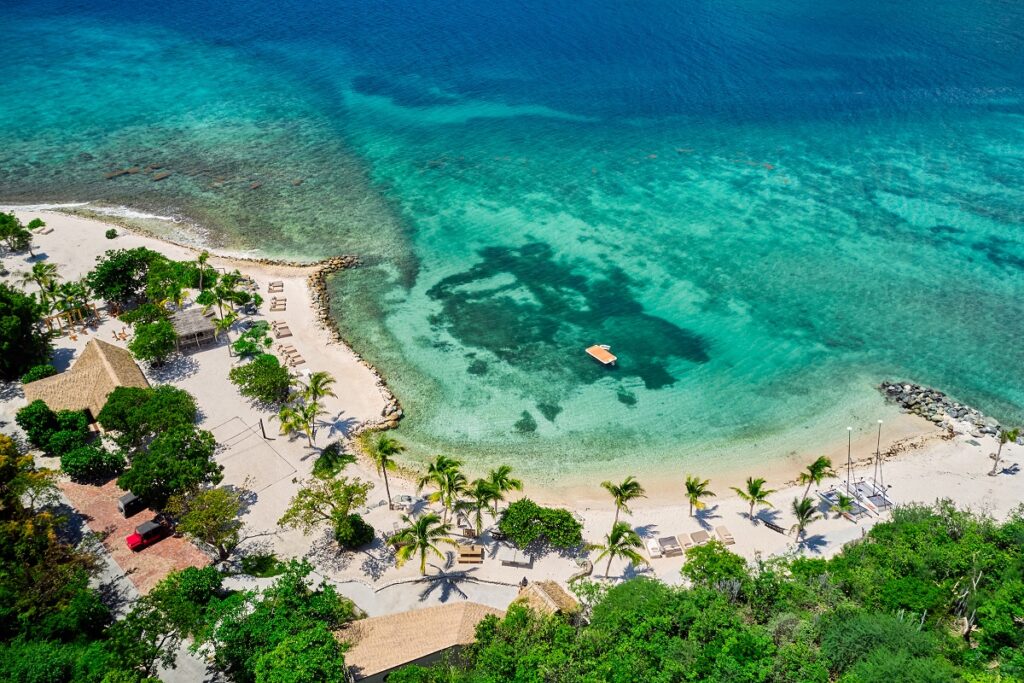The official British Virgin Islands currency is the US Dollar. You’ll find items priced with the dollar symbol throughout the islands and can use physical cash brought from the USA or another country that issues USD. This is very convenient for US travelers because they don’t have to convert costs mentally or worry about exchange rates.
Whether you’re coming from the United States or another part of the world for a vacation or retreat at The Aerial, BVI, understanding currency and local payment customs will help you make the most of your stay.
Currency in the British Virgin Islands
As a British overseas territory, the British Virgin Islands once used the British Pound. But even before they adopted the US Dollar as the official currency in 1959, people in the tourism and trade industries were already using the dollar, as it’s the most stable and universally accepted currency for global business transactions. It’s also convenient given the close economic ties between the BVI and USVI.
Today, the US dollar continues to be the official currency and is recognized as such by the British government. The British Virgin Islands government does not intend to replace the US dollar with a different currency, including a digital currency.
How to Pay for Things in the BVI
The best ways to pay for things in the British Virgin Islands are cash, credit, debit cards, and prepaid travel cards. At some locations, you can also pay with mobile apps. It’s best to arrive with a few different options in case a given shop doesn’t accept your preferred payment method.
At The Aerial, BVI: At our health and wellness resort, everything is included once you arrive on the island. However, if you choose to make a purchase from our Giving Shop, you can use the US Dollar and the purchase price will be used as a donation to the island’s non-profit.
Passports, levies, and taxes: It’s also important to keep in mind that you’ll need a valid passport to go to the British Virgin Islands and may be charged an Environmental and Tourism Levy of $10 upon arrival and a departure tax when you leave. For visitors who are traveling by air, any departure taxes are generally included in the ticket price.
Credit and Debit Cards
Credit and debit cards are widely accepted at major tourist-oriented businesses, including hotels, restaurants, tour companies, and larger stores. Please note:
- Most of these places take Visa or MasterCard, but may not take cards like American Express or Discover.
- It’s a good idea to check ahead and bring multiple cards or cash as a backup option.
- It’s important to inform your bank of your travel plans before you leave to ensure you’ll be able to make purchases and withdraw money internationally.
Cash and ATMs
Cards are accepted at most larger establishments. However, it’s important to carry some cash on you for local transactions, such as transport fares, tips for service, and purchases at markets and beach bars. For these expenses, try to keep smaller bills on hand, as this will make it easier for local vendors to provide change.
ATMs are available in major towns and tourist areas, including Road Town, the major Tortola ferry docks, airports, and cruise ship ports. Major attractions like Cane Garden Bay, Leverick Bay, and Spanish Town in Virgin Gorda have a few ATM locations.
Currency Exchange
Major banks in the BVI like Republic Bank (formerly Scotiabank) and CIBC FirstCaribbean International Bank can exchange money if you arrive with a currency other than USD. EUR, GBP, and CAD are the easiest currencies to exchange in the BVI. You can check the daily exchange rate for these currencies in person at the bank or online.
ATM Fees
ATM withdrawal fees depend on the agreement between the bank that issued your card and the bank operating the ATM where you withdraw money. If your bank charges a fee, you may see a “foreign transaction fee” listed on your statement. This transaction fee could be anywhere from a few cents to a few dollars.
International Money Transfer Fees
If you need access to additional funds from home in an emergency, you can arrange for an international money transfer to a US-dollar bank account in the BVI. Please note, however, that the fees for international bank transfers to the British Virgin Islands are high.

Prepaid Travel Card
Prepaid travel cards can be a convenient way to manage spending during your stay. Before your trip, you’ll load the card with a specific number of US dollars. This allows non-US visitors to avoid foreign exchange fees when traveling in the BVI.
There are a few limitations to prepaid cards. You cannot charge beyond the amount that you load and they usually have an expiration date. While these limitations may prove frustrating in some instances, the fact that the card isn’t linked to your personal bank accounts helps to keep your money safe.
Mobile Wallet
Mobile wallets like Apple Pay are becoming more popular internationally, including in the Caribbean region. Mobile payment solutions allow users to securely store their credit card information on their smartphones and make contactless payments with participating merchants.
If you have a mobile wallet set up and intend to use it while traveling in the BVI, it’s a good idea to have cash and/or a credit card on you just in case, especially when making purchases from smaller businesses that may not yet have adopted this technology.
Additional Money Tips for the BVI
There are a couple of additional things relating to money that you should keep in mind when planning a trip to the British Virgin Islands.
Tipping
The BVI has a tipping culture in which it’s customary to leave an additional 15% for good service at restaurants and the like. This custom holds even if a service charge is already included in the bill.
Local Markets
Markets selling produce, artisan crafts, and other local goods will most likely only take cash. Unlike at larger establishments, you can usually do some bargaining here. Always exercise caution with your wallet while walking through crowded markets or dealing with street vendors. It’s a good idea to keep important documents, cards, and cash separate, just in case.

Carry USD in a Variety of Forms for Travel in the BVI
Because the official British Virgin Islands currency is the US Dollar, it’s best to arrive with dollars in hand. Credit, debit, and prepaid travel cards can also be used at most larger businesses and tourist attractions.
For cash-only situations, there are some ATMs on the islands, but it’s a good idea to keep smaller bills on you to make it easier for vendors to issue change. As long as you notify your bank of your travel plans, you should find it easy to make purchases during your stay. The US-dollar economy is one of the many things that make traveling here both fun and easy!